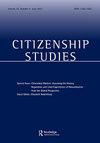The city and the clock in planetary times: revisiting Isin’s Being Political twenty years on
IF 1.9
3区 社会学
Q3 POLITICAL SCIENCE
引用次数: 0
Abstract
ABSTRACT This article highlights the profound contribution to Citizenship Studies of Engin Isin’s Being Political: Genealogies of Citizenship. Over the last twenty years, scholars have drawn on this seminal work to show how those positioned at the margins of citizenship have been central to its transformation. Key to Isin’s approach is the notion of the city as a difference machine – a paradigmatic formulation that captures the social and spatial dimensions of citizenship struggles. Reflecting on this notion twenty years on, I ask how it intersects with an emergent planetary imaginary in which a politics of time, as much as space, is increasingly explicit. I make a case for attention to the clock, alongside and as part of the city, where the clock is understood as a non-exhaustive symbol of the temporalities in and through which subjects become political. I pursue this approach in relation to a specific example: a 2020 case before the High Court of Australia concerning the power of the Australian government to deport Aboriginal persons who were not Australian citizens. The case speaks to complex interconnections between Indigenous politics, planetary politics, and citizenship, in and through which the city and the clock are being reconfigured.行星时代的城市和时钟:二十年来重新审视伊辛的《政治存在》
本文着重介绍了英格·伊辛的《政治存在:公民谱系》对公民研究的深刻贡献。在过去的二十年里,学者们利用这项开创性的工作来展示那些处于公民身份边缘的人是如何在公民身份的转变中发挥核心作用的。Isin方法的关键是城市作为一个差异机器的概念——一个典型的表述,抓住了公民斗争的社会和空间维度。二十年来,我反思这个概念,我问它是如何与一个新兴的行星想象相交的,在这个想象中,时间政治和空间政治越来越明显。我提出了一个关注时钟的案例,作为城市的一部分,时钟被理解为一种非详尽的象征,象征着暂时的事物,并通过它成为政治主题。我在一个具体的例子中采用了这种方法:2020年澳大利亚高等法院审理的一个案件,涉及澳大利亚政府驱逐非澳大利亚公民的土著人的权力。这个案例说明了土著政治、行星政治和公民身份之间复杂的相互联系,通过这种联系,城市和时钟正在被重新配置。
本文章由计算机程序翻译,如有差异,请以英文原文为准。
求助全文
约1分钟内获得全文
求助全文
来源期刊

Citizenship Studies
POLITICAL SCIENCE-
CiteScore
3.60
自引率
11.10%
发文量
85
期刊介绍:
Citizenship Studies publishes internationally recognised scholarly work on contemporary issues in citizenship, human rights and democratic processes from an interdisciplinary perspective covering the fields of politics, sociology, history and cultural studies. It seeks to lead an international debate on the academic analysis of citizenship, and also aims to cross the division between internal and academic and external public debate. The journal focuses on debates that move beyond conventional notions of citizenship, and treats citizenship as a strategic concept that is central in the analysis of identity, participation, empowerment, human rights and the public interest.
 求助内容:
求助内容: 应助结果提醒方式:
应助结果提醒方式:


